Intrigue
early 17th century (in the sense ‘deceive, cheat’): from French intrigue ‘plot’, intriguer ‘to tangle, to plot’, via Italian from Latin intricare (see intricate). intrigue (sense 1 of the verb), which was influenced by a later French sense ‘to puzzle, make curious’, arose in the late 19th century.
wiktionary
Borrowed from French intrigue, from Italian intricare, from Latin intrīcō(“I entangle, perplex, embarrass”). Doublet of intricate.
etymonline
intrigue (v.)
1610s, "to trick, deceive, cheat," from French intriguer (16c.), from Italian intrigare "to plot, meddle; perplex, puzzle," from Latin intricare "to entangle, perplex, embarrass" (see intricate).
Meaning "to plot or scheme" is recorded by 1714. That of "to excite curiosity" is from 1894 (OED calls this use "A modern gallicism"). It also could mean "carry on a clandestine or illicit sexual relationship" (1650s). The word appears earlier in English as entriken "entangle, ensnare; involve in perplexity, embarrass" (late 14c.), from Old French entrique or directly from the Latin verb. Related: Intrigued; intriguer; intriguing. Dutch intrigueren, German intriguiren are from French.
intrigue (n.)
1640s, "a clandestine plot;" 1660s, "secret plotting," probably from intrigue (v.). Also used from 1660s as "clandestine or illicit sexual encounter."
